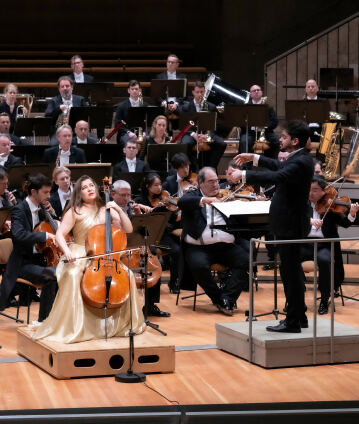Lahav Shani and Alisa Weilerstein

Two brothers vie for the love of a mysterious woman: Maurice Maeterlinck’s drama about jealousy, Pelléas et Mélisande, inspired Schoenberg to write a tone poem in which he sensuously depicts the love triangle. In Prokofiev’s Sinfonia concertante for Cello, we hear music that is both motoric and lyrical at the same time. Alisa Weilerstein plays the demanding solo part, with Lahav Shani conducting.
Between 1898 and 1905, four major composers – Fauré, Debussy, Schoenberg and Sibelius – published works based on Maurice Maeterlinck’s play Pelléas et Mélisande. The tragic love story, characterised by secrets, evocations of nature and the psychology of suggestion, seemed to magically attract musical adaptations. The almost simultaneous composition of Debussy’s opera and Schoenberg’s symphonic poem is particularly noteworthy as a link between French and German Modernism. Schoenberg’s work, written in Berlin at the beginning of the 20th century, follows its literary source down to the last detail and is conceived as a sequence of events in a single movement. However, the formal elements of a four-movement symphony can be recognised as a subtle structural pattern. Schoenberg constructs the work meticulously and shows himself to be a gifted melodist in the tonal language of late Romanticism.
While Pelleas and Melisande was written relatively quickly by a young composer, Sergei Prokofiev’s Sinfonia concertante for Cello and Orchestra had an unusually long genesis. In the 1930s – Prokofiev had fled from the October Revolution, first to the USA and then to France – he wrote a cello concerto. Back in Russia, cellist Mstislav Rostropovich encouraged Prokofiev to revise the piece, resulting in a completely new work. Rostropovich not only played the premiere of the Sinfonia concertante in 1952, but later also performed it twice with the Berliner Philharmoniker. Cellist Alisa Weilerstein, who made her debut with the orchestra in 2010, now follows in his footsteps. Lahav Shani is currently chief conductor of the Rotterdam Philharmonic Orchestra and the Israel Philharmonic Orchestra. He will take up the position of principal conductor with the Munich Philharmonic for the 2025/26 season.
© 2024 Berlin Phil Media GmbH
Related interviews
Artists
Our recommendations
- Elgar’s Cello Concerto with Alisa Weilerstein and Daniel Barenboim
- 2010 Europakonzert from Oxford with Daniel Barenboim and Alisa Weilerstein
- Lahav Shani and Francesco Piemontesi
- Andris Nelsons and Baiba Skride
- Herbert Blomstedt conducts Bruckner’s Eighth Symphony
- Claudio Abbado conducts music inspired by the Prometheus myth